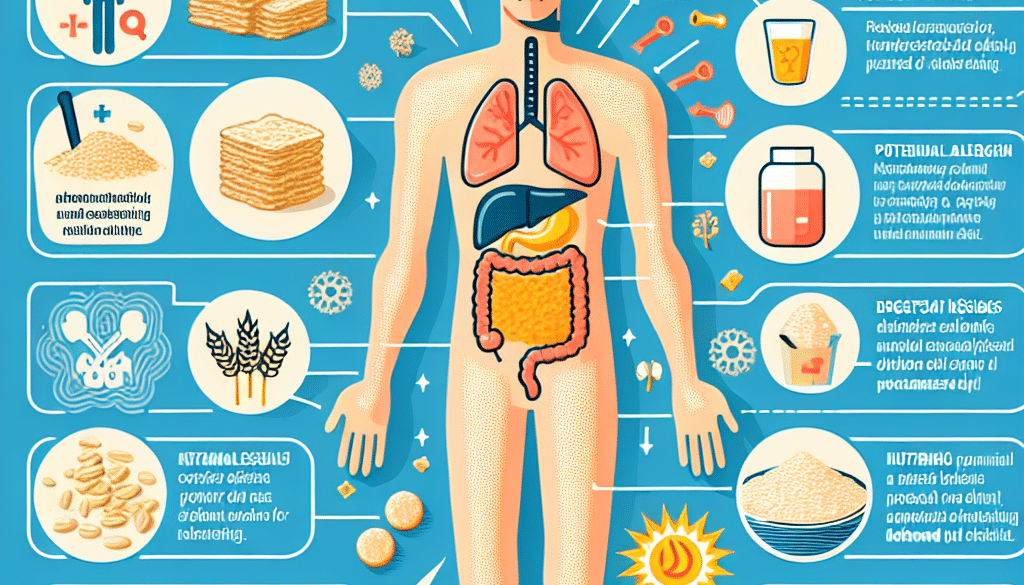What Are The Side Effects Of Processed Oats?
-
Table of Contents
- Processed Oats and Their Side Effects: An In-Depth Analysis
- Understanding Processed Oats
- Nutritional Alterations in Processed Oats
- Added Sugars and Preservatives
- Gluten Contamination
- Side Effects of Processed Oats
- Case Studies and Statistics
- Choosing Healthier Oat Options
- Conclusion: Balancing Convenience and Health
- Discover ETprotein’s High-Quality Protein Products
Processed Oats and Their Side Effects: An In-Depth Analysis
Oats are a staple in many diets around the world, known for their health benefits and versatility. However, as with many foods, the processing of oats can alter their nutritional profile and potentially introduce side effects. In this article, we will explore the side effects of processed oats, backed by research and expert insights.
Understanding Processed Oats
Before delving into the side effects, it’s important to understand what processed oats are. Oats undergo various levels of processing, from rolling and cutting to more extensive methods that strip away nutrients and add preservatives or sweeteners. The degree of processing can significantly impact the health implications of consuming oats.
Nutritional Alterations in Processed Oats
Processing can affect the nutritional value of oats. For instance, instant oats are often pre-cooked and dried, which can reduce their fiber content. This alteration can impact digestive health and the glycemic index of the oats, potentially leading to quicker spikes in blood sugar levels.
Added Sugars and Preservatives
Many processed oat products come with added sugars and preservatives to enhance flavor and shelf life. These additives can contribute to various health issues, such as weight gain, diabetes, and heart disease.
Gluten Contamination
While oats are naturally gluten-free, they are often processed in facilities that handle wheat, barley, or rye, leading to cross-contamination. This can pose a serious risk for individuals with celiac disease or gluten sensitivity.
Side Effects of Processed Oats
- Gastrointestinal Issues: The reduced fiber content in processed oats can lead to constipation or irregular bowel movements.
- Blood Sugar Fluctuations: Processed oats with a higher glycemic index can cause rapid increases in blood sugar, which is particularly concerning for diabetics.
- Weight Gain: The added sugars in processed oat products can contribute to excess calorie intake and weight gain.
- Allergic Reactions: Gluten contamination can trigger severe allergic reactions in sensitive individuals.
- Nutrient Deficiencies: Overconsumption of processed oats at the expense of other nutrient-dense foods can lead to imbalances and deficiencies.
Case Studies and Statistics
Research has shown that the consumption of whole grains, like unprocessed oats, is associated with a lower risk of chronic diseases. However, studies also indicate that the benefits are diminished when grains are heavily processed. For example, a study published in the American Journal of Clinical Nutrition found that the consumption of whole grains was inversely associated with weight gain, whereas refined grains were not.
Choosing Healthier Oat Options
To minimize the side effects of processed oats, consumers should opt for whole oat products, such as steel-cut or old-fashioned rolled oats, and be mindful of the ingredient lists on packaged oat products.
Conclusion: Balancing Convenience and Health
While processed oats offer convenience, they can come with side effects that may impact health. By choosing less processed oat varieties and being aware of added ingredients, individuals can enjoy the benefits of oats without the negative consequences.
Discover ETprotein’s High-Quality Protein Products
If you’re looking for alternative protein sources to complement your diet, consider ETprotein’s range of organic bulk vegan proteins. Their products, including various seed and bean proteins, offer a neutral taste and are non-GMO and allergen-free, making them a great addition to any health-conscious diet.
About ETprotein:
ETprotein, a reputable protein and L-(+)-Ergothioneine (EGT) Chinese factory manufacturer and supplier, is renowned for producing, stocking, exporting, and delivering the highest quality organic bulk vegan proteins and L-(+)-Ergothioneine. They include Organic rice protein, clear rice protein, pea protein, clear pea protein, watermelon seed protein, pumpkin seed protein, sunflower seed protein, mung bean protein, peanut protein, and L-(+)-Ergothioneine EGT Pharmaceutical grade, L-(+)-Ergothioneine EGT food grade, L-(+)-Ergothioneine EGT cosmetic grade, L-(+)-Ergothioneine EGT reference grade and L-(+)-Ergothioneine EGT standard. Their offerings, characterized by a neutral taste, non-GMO, allergen-free attributes, with L-(+)-Ergothioneine purity over 98%, 99%, cater to a diverse range of industries. They serve nutraceutical, pharmaceutical, cosmeceutical, veterinary, as well as food and beverage finished product distributors, traders, and manufacturers across Europe, USA, Canada, Australia, Thailand, Japan, Korea, Brazil, and Chile, among others.
ETprotein specialization includes exporting and delivering tailor-made protein powder and finished nutritional supplements. Their extensive product range covers sectors like Food and Beverage, Sports Nutrition, Weight Management, Dietary Supplements, Health and Wellness Products, and Infant Formula, ensuring comprehensive solutions to meet all your protein needs.
As a trusted company by leading global food and beverage brands and Fortune 500 companies, ETprotein reinforces China’s reputation in the global arena. For more information or to sample their products, please contact them and email sales(at)ETprotein.com today.












